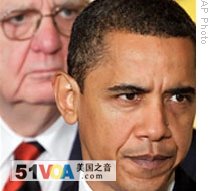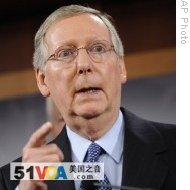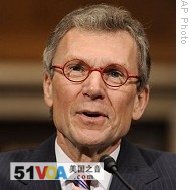Washington
06 February 2009
 |
| President Barack Obama, accompanied by Economic Recovery Advisory Board Chair Paul Volcker, at the White House, 06 Feb 2009 |
In the early days of his new administration, Mr. Obama's emphasis was on bipartisanship, reaching out to Republicans in hopes of a broad approach on the economy.
But in recent days the tone has changed - more partisan and more reminiscent of last year's presidential campaign.
Mr. Obama told House Democrats that it was time Republicans remembered that Americans strongly signaled a desire for change last November.
"They did not vote for the false theories of the past and they did not vote for phony arguments and petty politics. They did not vote for the status quo, they sent us here to bring change. We owe it to them to deliver," he said.
But even some moderate Senate Democrats are holding back their support for the stimulus bill, hoping to trim some of the spending.
Republicans have been down in the dumps since the November election, and they have seized on the stimulus fight to re-energize their dispirited conservative base.
 |
| Senate Minority Leader Mitch McConnell (file photo) |
The latest unemployment figures seem to buttress the president's call for quick action to stem the bleeding.
In January, the U.S. lost the largest number of jobs in a single month since 1974, and economist Mark Zandi said there appears to be no end in sight.
"Everyone knew it was going to be bad, and it is. It's a little worse than anticipated. It just confirms the fear that things are unraveling," said Zandi.
Polls indicate the public is very worried about the economy, but will give the new president time to get his program enacted.
 |
| Circuit City customers walk in and out of a store advertising major markdowns in San Jose, California, 26 Jan. 2009 |
Mr. Obama came into office on a wave of goodwill, with polls showing most Americans regard him as a strong leader, especially when it comes to dealing with the economy.
Author Mark Updegrove said it will be important for the new president to maintain that aura of leadership. He spoke on the C-SPAN public affairs network.
"I think first and foremost that character matters, and particularly during a time of crisis. The character of our leader can be extremely important in navigating the troubled waters that they face," he said.
Analyst Stephen Farnsworth said Mr. Obama is quickly finding out the differences between running a presidential campaign and governing the country.
"Passing a piece of legislation is a very different matter, and the Republicans have been successful in bringing up particular pieces of the stimulus bill to find areas where you can sow doubt in the utility of the whole measure. If you do not define your legislation, it will be defined by the opponents of the legislation," said Farnsworth.
Professor Farnsworth also has some advice for the president - there may be times when it pays to get tough with your opponents.
"I think that the most important thing to recognize about presidents is that you need to be feared. And one of the things that is unclear about Obama right now is what the price is for opposing Obama. It seems like there is not a really negative consequence for opposing the president, and if Obama is going to be successful, I think the Republicans are going to have to fear Obama more than they have so far," he said.
 |
| Tom Daschle on Capitol Hill in Washington on 08 Jan 2009 |
Daschle has been a combination mentor and confidant for the new president and his decision to withdraw over tax problems has left the administration without a leader in its push for health care reform.
Experts said some of these early troubles will be long forgotten if Mr. Obama manages to pass a stimulus plan soon.